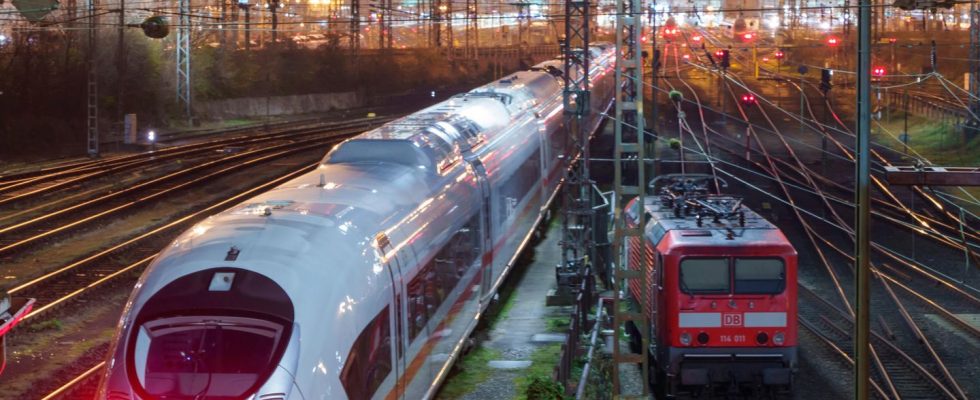questions and answers
Strike number six: Why does it escalate so often between GDL and Bahn?
On Tuesday night, the train drivers are expected to go on strike for the sixth time in this collective bargaining round
© Andreas Arnold / DPA
There is no progress in the tariff dispute at the railway. The GDL largely paralyzes rail traffic with new strikes. In the end, the railway will have to give in to the core demand, says an expert.
The tariff dispute at the railway has been demanding a lot from passengers for months. On Tuesday it could happen for the sixth time due to labor disputes by the union GDL comes to restrictions. The attempt by the railway to have the strike stopped by the courts is unlikely to change this. The group has filed an application for an interim injunction before the Frankfurt Labor Court.
What do passengers have to prepare for?
Regardless of whether the courts stop the strike or not, there are likely to be significant restrictions on rail on Tuesday. A decision was not expected until later Monday evening. It was considered unlikely that the railway would then overturn the emergency timetable that had already been drawn up and be able to put the full service back in place by the start of operations on Tuesday morning. Therefore, as with previous strikes, one in five long-distance trains is expected to be on the move. In regional transport, traffic could get back to normal more quickly in some places.
How long will the strikes last?
The tariff dispute at the railway has been simmering for months. Even a moderated negotiation phase with external mediators was unsuccessful. We talked to each other behind closed doors for weeks. A suggestion from the moderators to reduce the working hours for shift workers from 38 to 36 hours was rejected by the GDL. The political scientist Wolfgang Schröder from the University of Kassel assumes that the conflict can only be resolved by completely giving in to the GDL demand after 35 hours. “So it’s no longer a question of if, but of how,” he says. “The railway management should better recognize this sooner than later and negotiate on this basis.” The GDL’s demand for 35 hours without loss of wages is considered a sticking point.
Is it the toughest tariff conflict on the railway?
That depends on what standard you use. The collective bargaining dispute between the GDL and Deutsche Bahn was tougher in 2014/2015, both in terms of the duration of the collective bargaining dispute and the number of industrial disputes. Both sides struggled to find solutions for a whole year. Only formal mediation finally led to an agreement. With two warning strikes and six strikes, the GDL repeatedly brought traffic to a standstill.
The current dispute has been going on since November. But the GDL is now approaching the number of industrial disputes. After two warning strikes in November, a strike vote among members followed in December. Since then, indefinite strikes have been possible. If the next industrial action occurs on Tuesday, it would be the fourth strike since the vote and the sixth strike overall in the ongoing collective bargaining dispute.
Tariff conflict
Means with (side) effects: the successes of the GDL strikes in the past
The fact that the current conflict could seem much longer to some passengers is because last year the larger EVG also negotiated higher tariffs for months. There were also repeated labor disputes. Just a few months after an agreement was reached, the GDL collective agreement expired.
Why do GDL-Bahn tariff conflicts escalate so often?
This has, among other things, to do with the role of the GDL in the railway. Along with the EVG, it is the smaller of two unions that compete for members at the company. The so-called Collective Bargaining Unity Act stipulates that only the collective agreements of the employee representatives with the largest number of members are applied in a company. “That’s why, from what I’ve observed, the train drivers’ union is acting so incredibly stubbornly,” said the head of the Wirtschaftsweise, Monika Schnitzer, to the “Augsburger Allgemeine”. “The GDL wants to win more members and prove that it has more to offer its members. If there was only one union at the railway or if different contracts could be used, then the conflict would be less serious.”
In addition, the GDL is a small union. However, she mainly represents train drivers and train crew, without whom a train cannot run. A strike by these employees automatically has a major impact.
Could formal arbitration be a way out?
The railway had again asked the GDL to return to the negotiating table and brought formal arbitration into play. GDL boss Claus Weselsky rejects this. He referred to the recently failed negotiations, in which two experienced mediators – former Federal Interior Minister Thomas de Maizière and Schleswig-Holstein’s Prime Minister Daniel Günther – were at the table. But the talks were only of an arbitration nature. The two moderators were able to make a proposal for an agreement. But this was not binding. For formal arbitration, however, a prior arbitration agreement between both collective bargaining parties is required. This usually provides for the possibility of a binding arbitrator’s decision. So far there is no indication that the union is agreeing to this.
What should we make of demands to replace negotiators?
This demand comes primarily from the Union. “Mr. Seiler and Weselsky have become so entangled that they have to clear the way for new negotiators in the collective bargaining dispute,” said Union parliamentary group deputy leader Ulrich Lange to “Bild am Sonntag”. “Two people who are arguing here are obviously having a personal feud, and rail customers are having to endure it.” This refers to railway human resources director Martin Seiler and Weselsky. But heads in collective bargaining cannot be exchanged that easily.
“It works when it comes to railway management,” says political scientist Schröder. “This is a private company. And if they say the man can’t do it – which is obviously the case – someone new can come in.” But so far there is no sign that the company wants to replace Seiler.
At the GDL, such a step is even less likely. “This is a democratically elected representative against whom there are no reservations from within his own ranks,” emphasizes Schröder. “So there is no basis for it whatsoever.”
Should the federal government intervene?
In view of the deadlocked conflict, such demands are becoming louder. You can’t let the situation go on any longer, said CSU General Secretary Martin Huber in the RTL/ntv program ” Frühstart “. “In this respect, the federal government is required to participate in negotiations and mediate here.” Federal Transport Minister Volker Wissing (FDP) must also negotiate. The minister had recently repeatedly expressed criticism, especially about the behavior of the GDL. But the federal government made it clear again that it would not interfere. “There is collective bargaining autonomy in Germany. This also applies when things become inconvenient,” said government spokesman Steffen Hebestreit. Germany has been doing well with this regulation for more than seven decades.
“It would certainly be unpleasant if there was an intervention in front of the cameras, because with this symbolism it would have far-reaching effects on our understanding of collective bargaining autonomy,” says political scientist Schröder.


